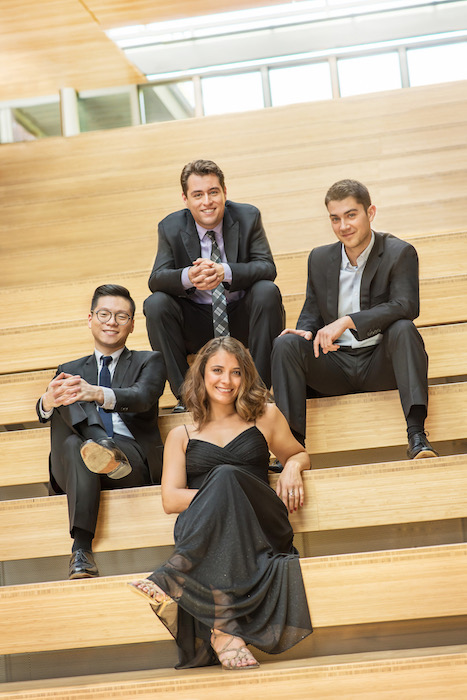Dover Quartet illumines the darkness at Winter Chamber Music Festival

With the Dover Quartet’s residency at Northwestern University just extended through the 2019-2020 season, it’s fitting that the Bienen School of Music’s excellent home ensemble opened the Winter Chamber Music Festival Friday night at Pick Staiger Hall.
The final, expansive quartets by Schubert and Tchaikovsky made up the bulk of the generous program, framing a centerpiece by Mason Bates.
Schubert’s Quartet in G major remains the least often played of his four late masterpieces in the genre, but in many ways it is his greatest achievement of them all. The work is epic, nearly 50 minutes in span. And even today Schubert’s posthumously published last quartet feels modern in its unsettled, constantly shifting tonality, explosive outbursts, and almost orchestral deployment, upper and lower strings often pitted against each other.
The Dover Quartet (violinists Joel Link and Bryan Lee, violist Milena Pajaro-van de Stadt, and cellist Camden Shaw) is ideally suited to Schubert’s music. Their refined, silvery sonority and turn-on-a-dime versatility consistently made a strong, eloquent, even revisionist, case for this massive work. Throughout the sprawling first movement, the players kept a fine balance, the dramatic surges and dark, existential bleakness countervailed by Schubert’s fragile lyricism and dance-like rhythms. The players sustained the long canvas with great skill, their firmly pointed dramatic urgency keeping narrative momentum.
The Dover members brought a distinctive touch to the ensuing Andante as well—their aristocratic delicacy in the nostalgic main theme made the eruptive contrast of the middle section even more jarring in its sudden violence.
Conversely, the Scherzo was lighter and more buoyant than often played, and the rustic Landler tune given unapologetic warmth and affection. In the finale, the players emphasized a jumpy, nervous quality beneath the sunny surface bonhomie of the galumphing main theme. Throughout the Dover Quartet kept the songful and dramatic elements in a finely calibrated equilibrium, playing with technical gleam and innate sympathy. This was not only distinctive, world-class Schubert playing but a fresh and thoughtfully conceived performance.
The playing was just as polished and responsive in Tchaikovsky’s Quartet No. 3, which led off the evening.
As with the Schubert work, Tchaikovsky’s Quartet in E flat minor was his last in the genre and, arguably, his best as well. Written in 1876, the work was dedicated to the memory of Ferdinand Laub, the accomplished Czech violinist who had premiered Tchaikovsky’s first two quartets with his ensemble.
The valedictory feeling is unmistakable in this score—immediately manifest in the elegiac introduction to the long opening movement and, especially, in the expansive slow movement (marked Andante funebre e doloroso).
At times one wanted more tonal ballast and outward Russian emotion in this music than the Dover’s lightish sonority mustered. Still, the musicians’ tautly focused performance supplied its own rewards with uncommonly blended ensemble and transparency and seamless transitions between sections. The Allegretto provided a less cheerful respite than usual, the musicians’ jabbing repeated notes more agitated than amiable.
That lack of sonorous weight apart, the Dover members charted the brooding slow movement with unsparing focus and searching expression. The pulsing lines built to a dramatic climax and the funereal closing section was duly atmospheric, tolling like an Orthodox church choir. Perhaps Tchaikovsky’s finale is fractionally less inspired than the preceding movements, but the vital and incisive playing made its hectic joie de vivre an effective payoff.
The evening’s enterpiece was Mason Bates’ From Amber Frozen. This early Bates piece (2004) displays some of his patented elements—namely syncopated riffs, down-tuned pitches, and batted-around pizzicatos. Yet the writing is fresher and the structure more secure here, and even Bates’ now-familiar devices seem more integrated and less shopworn. It’s hard to imagine finer advocacy for Bates’ populist style than that delivered by the Dover musicians who provided concentrated playing with meticulous dynamics, near-faultless rhythmic acuity and haunting high harmonics.
The Winter Chamber Music Festival continues with James Ehnes and Andrew Armstrong performing Beethoven violin sonatas 7:30 p.m. Sunday at Pick Staiger Hall. music.northwestern.edu
Posted in Uncategorized


